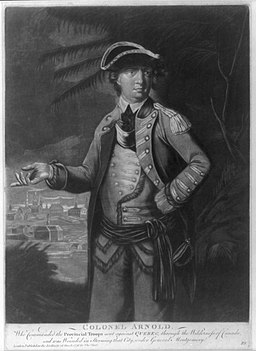Benedict Arnold is one of the most famous traitors in U.S. history. As a general in the American Continental Army, Arnold helped the Patriots win several key battles. However, he later switched sides, defecting to Britain in 1780.
Early Life
Benedict Arnold was born on January 14, 1741, in Norwich, Connecticut. In his early childhood, Arnold’s family was wealthy, and he attended private school. However, his father was an alcoholic, leading him to squander their money. Arnold was forced to abandon his private schooling and instead secured an apprenticeship in the apothecary business. Arnold went on to become a successful merchant, owing several businesses and ships.
On February 22, 1767, Arnold married Margaret Mansfield. They had two children before Margaret died on June 19, 1775. He later remarried. He and his second wife, Peggy Shippen, went on to have five children.
American Revolution
Arnold served in the militia during the French and Indian War. When the Revolutionary War broke out, Arnold joined the Continental Army. He played a central role in the battle of Fort Ticonderoga in 1775, working with Ethan Allen and his Green Mountain Boys to secure the fort and its valuable artillery. Arnold also helped halt the British advance during the Battle of Valcour Island one year later.
While Arnold was one of the Continental Army’s best combat officers, he believed that he was not properly recognized, with others taking credit for his actions and being awarded promotions ahead of him. Some historians suspect that his bitterness, combined with influence of his wife’s loyalist family, may have led to his betrayal of the Americans.
Treason
After being wounded at the Battle of Saratoga in 1778, Arnold left the battlefield to serve as the military governor of Philadelphia. During his tenure, Arnold lived lavishly and was accused of using his position for his personal benefit.
While in Philadelphia, Arnold’s wife Peggy maintained ties with British loyalists and members of the military, including British Major John André, who led the British espionage system in New York. In communications relayed by Peggy and André, the British promised Arnold £20,000 for the capture of West Point.
André was captured and the plot was discovered before Arnold had the opportunity to carry it out. Arnold was able to successfully flee to the British Army, which gave him protection. West Point remained under the American’s control, and news of Arnold’s treason is said to have bolstered morale.
“Spying was one thing, but his willingness to switch sides in the middle of an armed conflict, and fight against the men who had a year earlier been fighting by his side, was something that people of that time and maybe ours could simply not understand,” wrote Eric D. Lehman, author of Homegrown Terror: Benedict Arnold and the Burning of New London.
Later Life
After defecting to the British, Arnold received a commission with its army and took part in several minor battles. After the war ended, Arnold returned to England. He died on June 14, 1801, at the age of 60.









